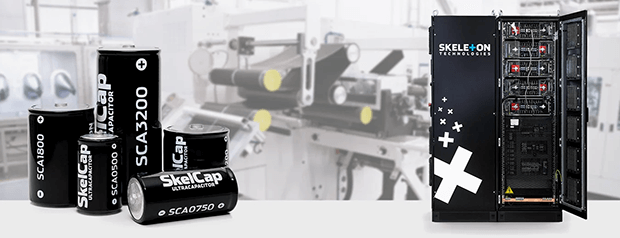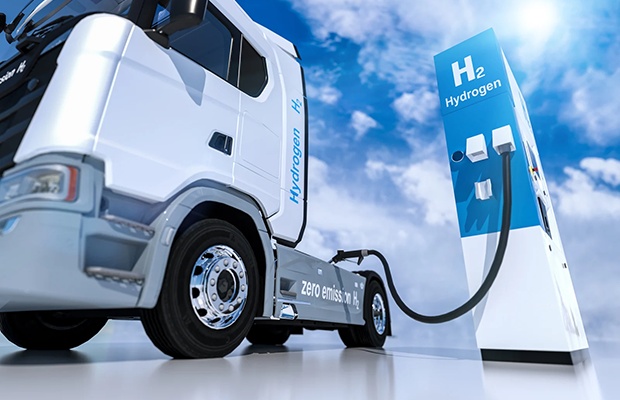Below is our recent interview with Taavi Madiberk, Co-Founder and CEO at Skeleton Technologies:

Q: This is the first time we have spoken. Can you provide a brief overview of Skeleton Technologies?
A: Skeleton Technologies is the global technology leader in ultracapacitor energy storage in automotive, transportation, grid and industrial applications.
For us, developing and producing the best ultracapacitor cells, modules, and systems in the world is a means to an end: helping companies to reduce CO2 emissions and save energy. Our ultracapacitors, based on patented “curved graphene”, represent the biggest technological advancement in the industry in the last 20 years and the use of this innovative material provides our products with an unparalleled advantage in power and energy density.
Skeleton Technologies Group has three main locations: manufacturing in Großröhrsdorf, Saxony, Germany, materials development in Bitterfeld-Wolfen, Saxony-Anhalt and electrical engineering in Tallinn, Estonia. From its foundation in 2009, the company has grown from 4 to more than 140 people.
Q: What are the key benefits of using your products?
A: As you may know, ultracapacitors are an energy storage technology that offers high power density, almost instant charging and discharging, high reliability even in extreme temperatures, and very long lifetimes (1+ million charge cycles). Using our products allow companies to save energy, lower their carbon emissions and fuel consumption, improve power quality and protect equipment and infrastructure from power peaks and power electrification. This is how the contribution of ultracapacitors in the fight against climate change is critical.
We already work with some of the largest companies in the world – from leading Tier One automotive firms and industrial equipment OEMs to truck fleet operators and aerospace prime contractors with great results. Just to give you an example, in cities like Mannheim or Warsaw, ultracapacitors used by our customers -Skoda Transportation in Germany and Medcom in Poland- in electric trams allow them to save around 30% of energy, significantly improving the efficiency of public transportation.
Ultracapacitors can do the same for hydrogen fuel cells: store the energy when it is available and release it with high power when it is needed. Fuel cells in conjunction with ultracapacitors can thus create high power with fast dynamic response, which makes it well suitable for automotive applications. We are already working with partners from the hydrogen sector such as Wrightbus, a leading bus OEM headquartered in Northern Ireland and a founding member of the H2Bus Consortium, to power hydrogen fuel cell buses in the UK. For the same reasons, ultracapacitors are also used to complement lithium-ion batteries. Batteries provide energy for the long term while ultracapacitors provide the fast reaction and high power. Using ultracapacitors in addition to lithium-ion batteries allow to use fewer batteries and for them to have a longer lifetime. We are not competing with lithium-ion batteries and hydrogen fuel cells; we are complementary in improving performance and lowering cost, therefore, speeding up market adoption of these technologies.
Our ultracapacitors have up to 60 times the power density achieved by batteries and four times the power density of ultracapacitors from Maxwell, recently acquired by Tesla, this clear competitive advantage has for instance been proven by an independent study backed by the US Office of Naval Research.
Q: Can you describe a typical use case or customer scenario for your solution?
A: Ultracapacitors excel where other energy storage technologies fail and this gives us the opportunity to help companies that otherwise might not be able to hybridize or electrify their businesses. We are successfully in commercial use with excellent field results from leading blue-chip customers in transportation, grid, industrial applications. We can for instance mention organizations and companies such as Medcom and Skoda Transportation (trams), Wrightbus (hydrogen fuel cells buses), PESA (locomotives and railways), Attabotics (a Canadian robotics supply chain company), the European Space Agency, among others. We also work with a major North American OEM (original equipment manufacturer) in the automotive sector, the leading manufacturer of medical equipment and the world’s leader in renewable energy production.
Applications can be very diverse and range from wind turbine pitch control, KERS (Kinetic Energy Recovery System) in the transportation sector (trams, rail, trucks…), engine start, power peak for driving simulators for testing autonomous vehicles, power quality for MRI machines, instant charging of warehouse robotics and hybrid electric port cranes… KERS for heavy transportation can reduce fuel consumption by up to 32% for urban delivery trucks. The system takes advantage of the high power density and almost instant charging and discharging of ultracapacitors by harnessing braking energy and using it for acceleration. In buses, the integration of our ultracapacitors enables a 36% fuel saving and decrease in carbon emissions. Our ultracapacitors also deliver 34% fuel savings in one of the largest container terminals in the Baltic Sea in port crane applications.
As for the automotive industry we are currently preparing for scale-up, the contracts have been signed and the manufacturing at scale starts Q2 2022.
Q: You’ve recently raised approximately $49 Million in Series D funding; can you tell something more?
A: We have raised €41.3 million of equity in Series D financing round, bringing our total capital raised to over €93 million. New investors include leading European industrial investors and a group of entrepreneurs that grew payments company Adyen from its inception to successful IPO. All existing investors in the company joined the equity raise: EIT InnoEnergy – a leading European investor in sustainable energy innovations including European gigafactory startup Northvolt — FirstFloor Capital, MM Grupp and Harju Elekter. This investment is in the top five funding rounds for the cleantech sector in the EU this year and will further accelerate our growth. Despite COVID-19, the company will see three-fold revenue growth for the second year in a row and our total contract backlog is currently over €150 million.
Q: What are your plans and goals for the future?
A: This investment will support and further accelerate our growth, we will invest in three main categories:
Firstly, new technology development in our manufacturing site in Grossröhrsdorf – we have successfully started a project together with Karlsruhe Institute of Technology (KIT), developing the next generation products based on our SuperBattery technology. This exponentially increases the energy density from today’s products.
Secondly, development of new module product lines for wind and industrial sectors, this in relation to one of the large-scale wind industry contracts, that we signed recently.
Thirdly, additional investments for scaling up production of a new product line for the automotive sector from Q4 2021.
We have the right products to capture a dominant market share in the ultracapacitor industry globally and we have a clear roadmap to further increase our competitive advantage and increase both the energy and the power density of our products. So, we expect to become the world’s leader in ultracapacitor energy storage and one of Europe’s cleantech giants in the future.

 Recommended:
Recommended:  Recommended:
Recommended: 